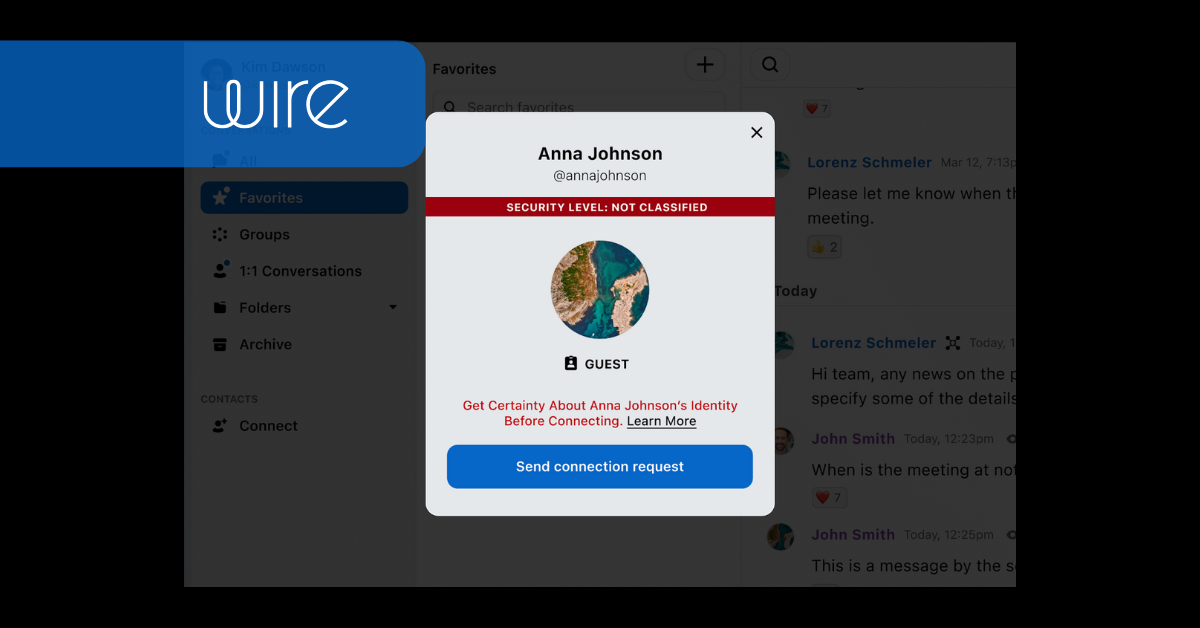The recent security vulnerability discovered in Signal has sparked important conversations about the suitability of messaging apps for sensitive communications, especially within organizations. As the SVP of Product at Wire, I want to take this opportunity to discuss how Wire's design and security features address these challenges and why Wire is uniquely tailored for secure organizational communication.
Signal's Vulnerability: Users choice!
Signal was implicated in an incident where a journalist was accidentally added to a sensitive group chat discussing military operations. This error highlights the risks of using consumer-focused messaging platforms for high-stakes organizational communication.
Why Wire Is Different
Wire is built from the ground up with organizational security in mind. Unlike Signal, which excels as a consumer messenger, Wire is designed for teams and enterprises that require stringent security measures and usability features tailored to professional environments. This organizational focus is why you can start your Wire journey by creating a team.
Key Features That Set Wire Apart
1. Guest Management with Visual Indicators
One of Wire’s standout features is its ability to manage external participants seamlessly. When guests are included in a conversation, Wire displays a clear blue flag at the top of the chat stating "Guests Present." This visual cue ensures that all internal participants are aware of external involvement, reducing the risk of accidental disclosures. In the two screenshots below, you can see the internal vs the guest view of the chat.

|
| Team internal view on a group chat with guests present |
 |
| Group Chat View for the guest |
2. Making Security Clearance Crystal Clear
Wire takes the concept of external and guest users and expands on it, particularly when multiple different Wire on-backends are federating with one another. Wire configuration parameters allow linking users and permission levels. Wire allows you to create group conversations mixing users from different backends, but brings a great number of features to facilitate secure information exchange, again by informing the users about the current state of the conversation clearance. This includes a visible banner if all participants are on the same security clearance. Resulting in displaying confidential, secret or top secret banners based on the participants’ clearance level.
While mistakes still can happen, it is a great deal more obvious to users what can be shared or not, making incidents like Signal-Gate or the Taurus affair much less likely.
 |
| When connecting to a person, the formal levels are displayed and the team status is clearly visible |
3. Designed for Organizations
Wire integrates features that prioritize organizational workflows, such as group chats with up to 2000 participants, file sharing, voice, memos, and cross-platform compatibility. These capabilities make it ideal for businesses handling sensitive information while maintaining compliance with regulations like GDPR and ISO standards, going beyond all these standards and creating a user focused security.
Usable Security: Built for Organizations
At Wire, we believe security should not come at the expense of usability - especially for teams navigating complex workflows. Features like guest flags are designed to make security intuitive and actionable for users without requiring technical expertise.
Wire’s focus on organizational needs ensures that accidental errors - such as adding unintended participants - are minimized through thoughtful design choices and clear visual indicators.
Conclusion: Choosing the Right Tool
While Signal remains an excellent choice for private consumer communication, its vulnerabilities underscore why organizations should opt for purpose-built solutions like Wire. By prioritizing usable security and collaborating with enterprise clients globally, Wire delivers a secure environment where sensitive communications can thrive without compromise.
